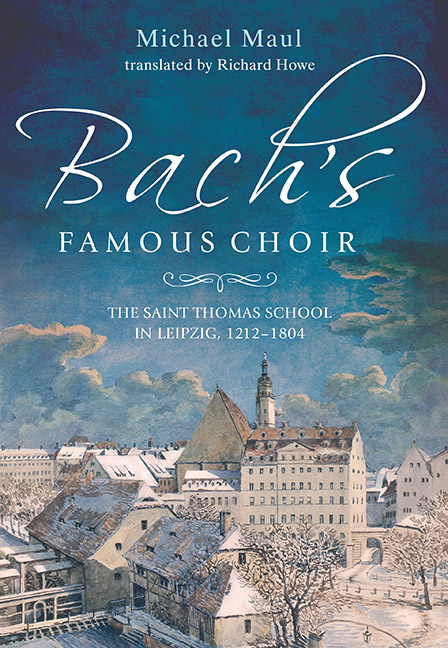Book contents
- Frontmatter
- Dedication
- Contents
- List of Plates
- Author's Note on the English Edition
- Translator's Note
- Preface
- Organization of the St. Thomas School in the 17th and 18th centuries
- Introduction
- I From Monastery to Municipal Music School, 1212–1593
- II How the St. Thomas School Became a Music School, 1594–1640
- III ‘Famous Throughout the Whole World of Music’, 1640–1701
- IV ‘Odd Authorities with Little Interest in Music’: the St. Thomas School in Crisis, 1701–1730
- V School for Scholars or ‘Conservatory of Music’? An ongoing conflict, 1730–1804
- Appendices
- Endnotes
- Bibliography
- Index of Persons
IV - ‘Odd Authorities with Little Interest in Music’: the St. Thomas School in Crisis, 1701–1730
Published online by Cambridge University Press: 04 April 2019
- Frontmatter
- Dedication
- Contents
- List of Plates
- Author's Note on the English Edition
- Translator's Note
- Preface
- Organization of the St. Thomas School in the 17th and 18th centuries
- Introduction
- I From Monastery to Municipal Music School, 1212–1593
- II How the St. Thomas School Became a Music School, 1594–1640
- III ‘Famous Throughout the Whole World of Music’, 1640–1701
- IV ‘Odd Authorities with Little Interest in Music’: the St. Thomas School in Crisis, 1701–1730
- V School for Scholars or ‘Conservatory of Music’? An ongoing conflict, 1730–1804
- Appendices
- Endnotes
- Bibliography
- Index of Persons
Summary
Bach's letter to Erdmann
In the fall of 1730, the forty-five-year-old St. Thomas school cantor, Johann Sebastian Bach, took up his pen in order to write a letter to his old schoolmate, Georg Erdmann, with whom he had attended school in Ohrdruf. In 1700, the two had travelled together to Luneburg, where they had both enrolled in the St. Michaelis school. Erdmann had gone on to study law, and in 1718 had become Russia's diplomatic representative in Danzig. In 1726, after a long pause, Erdmann attempted to resume contact with Bach, asking for news of his Fatalitäten, i.e., the main events of his life over the last two decades. But the St. Thomas cantor let their correspondence fall by the wayside again after just one short letter – probably on account of ‘his many activities’ that scarcely left time enough even for ‘the most necessary correspondence’ – and in 1730, Bach still owed Erdmann the news he had been asked for in 1726.
Now, on October 28, 1730, Bach informed Erdmann that his familial situation was satisfactory. By now he had seven children from two marriages (four sons and three daughters); all of them were ‘born musicians’, with whom he could present vocal and instrumental concerts, especially because his second wife, Anna Magdalena, ‘sings a good, clear soprano’ and his eldest daughter ‘joins in not badly’. The picture Bach drew of his professional situation was, however, completely different. His former master, Prince Leopold von Anhalt-Cothen, was a prince ‘who both loved and knew music’, for which reason Bach had believed he could live out the rest of his life in Cothen. But as fate would have it, in December 1721, the regent married a totally unmusical princess from Bernburg (his second marriage), as a result of which the prince's future ‘inclination’ to music was already in danger. And because the Leipzig cantorate had been described to Bach as ‘so favorable’, and the town had in any event offered much better educational opportunities for his sons than Cothen, in the end he had moved to Leipzig, but only after much deliberation, because ‘it did not seem at all proper to me to exchange my post as capellmeister for that of a cantor’.
- Type
- Chapter
- Information
- Bach's Famous ChoirThe Saint Thomas School in Leipzig, 1212–1804, pp. 141 - 208Publisher: Boydell & BrewerPrint publication year: 2018



